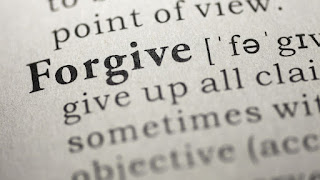The Faith of Mr. Rogers, Week 6
This year I've been going through a new book, "The Simple Faith of Mr. Rogers." Written by Amy Hollingsworth, a minister and friend of Fred Rogers, it chronicles nine simple lessons she learned about faith from him. I've read it through a couple times, and have been looking at it with my Sunday School Group. Over the next few weeks, I'll be offering short reflections on what I've learned from each segment.
When I saw this chapter, I remember thinking how tough this was going to be. Forgiveness is a beautiful, wonderful, powerful, and necessary thing. But it's also tough at times. It's tough to let go of anger and hurt. It's tough to move on. Even for deeply spiritual people it can be tough. And I knew this chapter would be tough, too.
Fred offers a quote, though, that I found moving. He said, “It’s one of the toughest things in the world when someone has hurt you, and you can find within yourself the strength to begin the whole process of forgiveness. It turns out to be the gift to you, not so much the gift to the person you’re forgiving.”
Fred was moved by the hurt he saw in the world, and it hurt him. It especially hurt him to see people trying to solve these hurts with anger and violence. His call to people was to find better ways to channel the anger from these hurts and to learn to let go, not so much for others, though it's a gift to them, but as a means of freeing ourselves to be what God wants us to be.
The chapter includes a powerful story from Cardinal Joseph Bernadin, who was falsely accused of abusing a Seminary Student. In the wake of that accusation, though close to death himself, he took time to share communion with his accuser, the ultimate act of forgiveness.
What also spoke to me was the idea in this chapter that, while Mr. Rogers tried to present an ideal world in his neighborhood, that isn't always reflected in the world we see. The chapter begins, and contains within it passages from “Every Word You Said” by Mark Robertson. It’s a book that looks back at Mr. Rogers and the world he wanted to provide on The Neighborhood, then contrasts that with our world. The chapter begins with this quote: “Well, the older I get, man, the less I believe in all those wonder things I used to see with those young eyes. What could have happened? So am I just growing up, or is something else gone? Is the land of make believe all gone? Old King Friday just looks like a puppet, still. Can you say jaded? Or misunderstood? Can you say hatred? Yes, I knew you could. I knew you could.” Amy argues that Robertson’s book isn’t an indictment of The Neighborhood, and that Fred wasn’t oblivious to the idealized world he tried to present. He hopes that the presentation could, in some way, make the harsh reality of life better.
And I think that's something we can all do to make the world a bit of a brighter place. And considering where we are right now with all the troubles in our world, anything we can do is worth trying.




Comments
Post a Comment